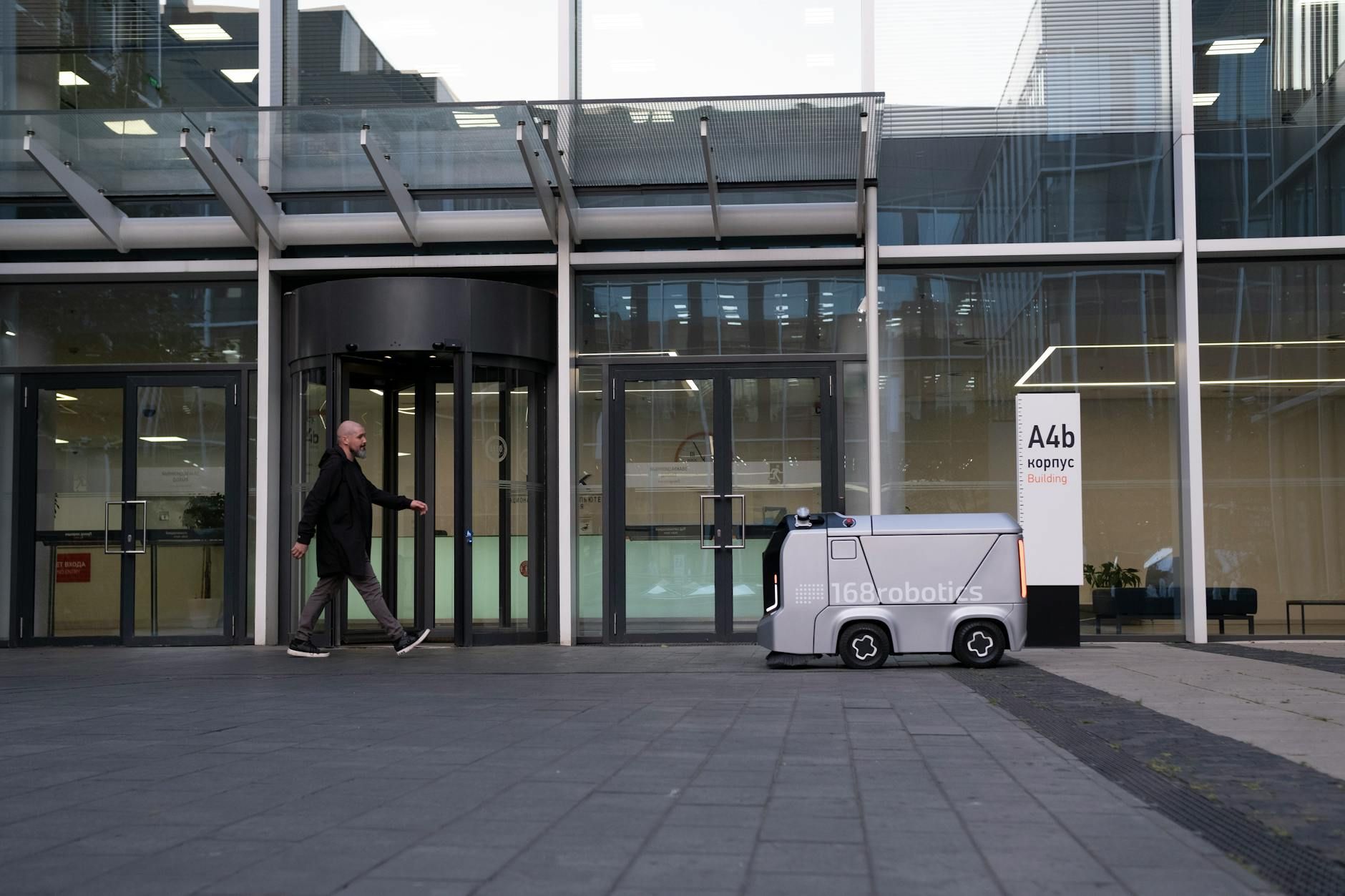ACA – Agentic Commerce Agency
Fast-Track Your Success with Business AI Adoption Today
Business AI adoption is no longer a lofty concept reserved for tech giants. Today, you, as an e-commerce director, CMO, or digital leader in the $2M–$50M revenue range, can accelerate growth by integrating artificial intelligence into your everyday operations. From customizing shopper experiences to streamlining back-end processes, AI technology transforms how you engage customers and drive efficiency. By embracing these new solutions, you secure a competitive edge in agentic commerce and empower your team to thrive in a rapidly evolving digital market.
Below, you will discover what business AI adoption looks like, why it matters, and how you can put it into practice. You will gain insights on building an actionable AI implementation roadmap, overcoming common obstacles, and measuring success so that you can confidently fast-track results.
Embrace business AI adoption
The promise of AI extends far beyond automation. With the right strategy, you can find relevant ai business use cases for customer service, marketing, inventory management, and many more operational areas. Rather than seeing AI as just another trend, view it as a powerful tool that can help your organization become more agile and data-driven. When your business leverages AI, you enhance decision-making, uncover new revenue channels, and minimize tedious manual tasks.
Why AI adoption matters now
- You establish early leadership in agentic commerce, an emerging shopping paradigm where intelligent agents research and purchase on behalf of customers.
- You meet rising consumer expectations for personalized and seamless online experiences.
- You free up your team’s bandwidth, allowing them to focus on creative problem-solving and strategic pursuits.
- You convert raw data into actionable insights, empowering better forecasting, resource allocation, and innovation.
How AI ignites transformation
AI is already disrupting retail, healthcare, finance, and more. By adopting AI solutions in your business, you can:
- Enhance operational efficiency: Automate repetitive tasks to reduce human error and improve accuracy. Explore business process automation ai for an expanded perspective on automating workflows.
- Increase agility: Anticipate market shifts more effectively, and shift resources instantly based on real-time insights.
- Upgrade customer experiences: Offer hyper-personalized product recommendations, dynamic pricing, chatbots for instant service, and more.
- Foster innovation: Integrate data analytics, predictive modeling, and machine learning to discover hidden growth opportunities.
Recognize agentic commerce potential
Agentic commerce is the next frontier in online shopping. It involves AI-driven agents that handle product research, compare prices, and even carry out purchases on behalf of customers. While this might sound futuristic, early adopters are already harnessing this concept to streamline the buying process.
How agentic commerce redefines shopping
- Intelligent assistants: Virtual agents automatically tailor product suggestions to your customers’ preferences.
- Real-time price negotiation: Automated systems find the best deals based on predefined user parameters.
- Hands-free transactions: AI handles checkout and payment processes with minimal user input.
- Data-driven personalization: Every customer interaction refines the AI agent’s “understanding,” resulting in more accurate, relevant recommendations.
By aligning your digital strategy with agentic commerce concepts, you can meet shoppers on the channels they prefer, in real time. In turn, you open doors to new revenue streams and improved customer retention. If you plan to expand your offerings to meet agentic commerce demands, explore agentic commerce solutions for further inspiration.
Lay the groundwork for AI success
Before you dive into launching a dozen AI projects, it is crucial to prepare your organization. A solid foundation ranges from data readiness to a prepared workforce. Spending time on these early steps helps you avoid costly missteps and ensures that your employees embrace the transition.
Evaluate current workflows
Perform a thorough assessment of manual processes, departmental bottlenecks, and data inefficiencies. This evaluation tells you where AI can provide the greatest benefit. For example, if your marketing team spends hours segmenting customer lists, an AI-powered segmentation tool may drastically reduce their workload. Consider referencing digital transformation ai to discover how larger restructuring may complement your AI initiatives.
Identify AI’s role
Once you have identified bottlenecks, map out the specific AI solutions that align with your growth objectives. You might think of:
- Predictive analytics platforms to forecast demand.
- Natural language processing for advanced chatbot support.
- Machine learning algorithms to refine product recommendations.
If you are not sure which tools suit your workflows, explore business ai tools for an overview of possibilities.
Build a strategic roadmap
With a list of potential solutions in hand, create a phased plan for adoption. A roadmap keeps you focused on immediate priorities while preparing for larger-scale integration down the line. Outline specific milestones, budgets, and success metrics. If you need a structured approach, refer to an ai implementation roadmap to help outline goals, responsibilities, and timelines.
Prepare your team
Because AI can reshape daily tasks, your employees need training and support. Introduce them to the basics of machine learning, data analysis, and automated decision-making. Make sure you highlight the benefits: relief from repetitive tasks, smarter insights, and new opportunities to develop creative business ideas. If you want to go deeper, implementing ai in business offers a helpful guide on how to transform your workforce mindset.
Start small and scale
Pilot a single AI project to secure early wins. Pick a specific department (such as marketing or customer service) or a discrete project (like automated email segmentation) to test results quickly. Once you prove its impact, you can scale up to more ambitious ventures, such as ai in business decision making across various departments.
Overcome AI implementation roadblocks
Despite significant promise, adopting AI often comes with challenges. From data quality issues to fear of change, you might encounter friction during integration. Recognize these hurdles and address them head-on so your transformation remains on track.
Data readiness
Machine learning models thrive on quality data. However, inconsistent or incomplete records can lead to unreliable predictions. Ensure that you have a solid data governance framework in place before rolling out any AI tool. That means cleaning existing data, unifying data formats, and setting processes to maintain accuracy. If you need to refine your data pipelines, learn more about ai implementation challenges and ways to overcome them.
Tech compatibility
AI systems might not always mesh easily with your current tech stack. Assess your infrastructure for storage, networking, security, and compute power. A mismatch can lead to costly upgrades, downtime, or suboptimal performance. Sometimes, you might have to reevaluate your architecture to support large-scale analytics or complex AI workloads. In such cases, consult with specialists in business ai integration.
Regulatory compliance
Handling user data for AI often introduces complexities around privacy, data protection, and transparency. Check local and international laws that apply to your sector. Regularly audit your processes to ensure compliance and maintain consumer trust. Prepare your teams to handle personal data responsibly, especially if you plan on using consumer information for training models.
Explore top AI solutions for e-commerce
When it comes to e-commerce, AI empowers you to analyze, predict, and act on vast amounts of customer and operational data. Below are some categories of AI solutions you can look into, along with how they might fit into your strategy.
Personalization engines
Customers want tailored experiences. AI-driven personalization engines track real-time and historical behaviors, then deliver relevant product suggestions or marketing messages. Implementing personalization can:
- Improve conversion rates.
- Increase average order values.
- Enhance customer satisfaction.
Automation tools
Automation covers everything from inventory management to email marketing. By automating repetitive tasks, your staff can devote time to strategic planning, creative thinking, and core decision-making. Investigate business automation with ai to learn how you can seamlessly integrate automation into your day-to-day workflows.
Predictive analytics
Forecasting demand, sales, and revenue is more accurate when you deploy machine learning algorithms. Over time, these models pick up on seasonal changes, external factors, and consumer behaviors that might not be obvious to human analysts. Applying predictive analytics also ensures you keep the right products in stock while minimizing overstock scenarios. Check out ai for business efficiency to dive deeper into this topic.
Chatbots
AI-powered chatbots now resolve customer service queries, recommend products, and process returns seamlessly. By leveraging natural language processing, you can cut wait times and offer consistent, 24/7 customer support. Implementing an intelligent chatbot is often a low-risk pilot that showcases the value of AI to internal stakeholders.
Agentic commerce platforms
Agentic commerce is the future of online shopping, so explore specialized AI infrastructures that let you harness autonomous product searching, automatic price comparisons, and more. If your aim is to be an industry pioneer, take a look at emerging agentic commerce platforms that can help integrate agentic technology into your store.
Integrate AI into daily operations
Introducing AI is not just a one-off project. To realize its benefits, you will want to embed these solutions in multiple departments over time. Take a step-by-step approach.
Marketing
Leverage AI to refine audience targeting, automate email campaigns, and optimize ad spend. Machine learning lets you identify high-value segments with greater precision and test new messaging strategies faster. AI-generated insights can guide you in real time, eliminating guesswork. If you are ready to use data for marketing decisions, an ai project implementation strategy can point you where to start.
Customer service
In addition to chatbots, you can implement AI for sentiment analysis on social media, automated feedback scoring, and predictive issue resolution. A data-driven support system understands user frustrations before they escalate, helping you maintain brand loyalty.
Inventory management
Avoid out-of-stock and surplus situations by using AI-driven forecasting tools. These tools use trends, historical data, and seasonality to inform stock levels. For more detailed advice on aligning AI with your operational procedures, consider exploring ai-driven business implementation.
Fraud detection
AI models excel at analyzing patterns in large transaction datasets. By flagging irregular activities, you minimize financial risk and suspicious behavior. Early detection of fraudulent orders or payment anomalies can save you both time and money.
Pricing
Dynamic pricing helps you keep pace with market trends and competitor movements. AI monitors real-time data and factors such as demand, customer location, purchase history, and competitor rates. This capability allows you to adjust prices automatically to maximize revenue without manual guesswork.
Measure success with AI in business
After you adopt AI, your leadership team will want to see concrete results. Clear metrics and regular evaluations tell you what works and what needs recalibration.
Performance metrics
Depending on your goals, measure metrics such as:
- Conversion rate changes.
- Customer satisfaction (CSAT) or net promoter scores.
- Operational savings in labor or time.
- Revenue growth or margin improvements.
Set baseline numbers before you launch an AI initiative. That way, you can compare actual outcomes with your initial forecasts. If your AI solution significantly beats these baselines, you know you are on the right track.
Iteration and continuous improvement
AI thrives on iterative learning. As it processes new data, the system becomes more accurate, and your results continue to improve. Encourage a culture of ongoing innovation, where employees are empowered to suggest updates, expansions, and alternative uses for AI once they see it in action. For guidance on scaling or fine-tuning, explore enterprise ai implementation.
Consider the future of agentic commerce
The evolution of agentic commerce is poised to redefine how businesses and consumers interact online. AI agents will handle increasingly human-like tasks, from finding products to auditing supply chains. As a forward-thinking leader, you must stay informed about emerging technologies, platforms, and use cases.
Key agentic commerce trends
- Greater personalization: Advanced algorithms that learn over time, offering unique experiences for each shopper.
- Voice and image searches: AI-based systems that recognize voice commands or images, streamlining user interactions.
- Connected ecosystems: Unified databases that seamlessly combine front-end shopping experiences with back-end logistics and supply chain data.
To stay ahead, review agentic commerce technology and agentic commerce trends that can illuminate where your industry is headed. By preparing your organization now, you build a resilient foundation for continued innovation.
Take the next step toward AI
It is tempting to let uncertainty slow you down, but taking the first steps positions you to benefit from AI’s revolutionary potential sooner rather than later. As you integrate AI solutions, always align them with your most pressing business objectives. If you keep your focus on driving better customer experiences, improved processes, and data-backed decision-making, your AI journey will unlock genuine value.
Build your AI strategy
Start crafting your own strategy by answering these questions:
- Where could AI improve your current workflows?
- Which departments stand to gain the most from automation and data insights?
- Which metrics will define success at frequent intervals?
- Is your team equipped with the necessary training and understanding of AI concepts?
These considerations form the backbone of a robust AI plan. If you need a clear framework to develop a unified approach, read about business implementation strategies.
Partner with an expert
Collaborating with professionals who specialize in AI can dramatically shorten your learning curve. At Agentic Commerce Agency , we help businesses like yours integrate AI tools, manage organizational change, and streamline digital transformations. Whether you need a comprehensive ai implementation roadmap, guidance on business ai deployment , or help refining your agentic commerce strategy , we can walk you through the journey step by step.
By working hand in hand with experts, you fast-track results and avoid tricky pitfalls. Ultimately, you build a long-term AI strategy that aligns with your revenue goals and brand vision. If you are ready to discuss how AI can fit into your e-commerce operations, contact us to get started.
Conclusion
Business AI adoption promises to revolutionize how you run your operations, connect with customers, and prepare for a new era of agentic commerce. By embracing powerful technologies like predictive analytics, chatbots, and personalization engines, you can streamline workflows, boost customer satisfaction, and uncover new revenue opportunities. Success in AI often hinges on thorough planning, staff alignment, and incremental scaling, so do not overlook the foundational work of data governance and process mapping.
The future of e-commerce is swiftly becoming automated, personalized, and ever more intelligent. Taking steps now positions you to claim an early advantage, even as agentic commerce transforms retail. Dive into the available ai business implementation resources, test small pilot projects, and scale them once you see results. As you do, keep measuring impacts, adapting to new insights, and refining your approach to stand out in a competitive market.
If you are ready to learn more, visit Agentic Commerce Agency to see how we can support your AI journey. There has never been a better moment to fast-track your success with business AI adoption. The opportunity is yours—take it, evolve your digital strategies, and solidify your place as an innovative leader in the age of agentic commerce.
SHARE THIS POST:
Leave A Comments:
Our Recent Posts:







